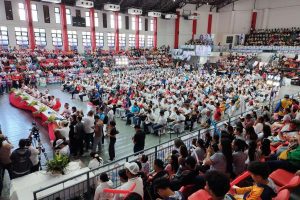Senator Imee Marcos has urged the Department of Agriculture (DA) to review a recent memorandum order that will limit the type of fertilizer that rice farmers can use.
Signed on April 27, Memorandum Order 32 (MO 32) promotes the distribution of yet unnamed biofertilizers to rice farmers nationwide, in place of inorganic urea.
Farmers’ groups reaching out to Marcos’s office expressed fears that the government project could put their crop yields and potential income at risk.
“Biofertilizers benefit soil ecosystems but can they duplicate past levels of rice production?” the senator asked.
Marcos noted that the El Niño phenomenon’s near certainty this year already poses a threat to rice production, with water allocated for irrigation from Angat Dam scheduled to be cut.
“Biofertilizers still need to be tested on a sufficient scale to prove that rice production costs can be lowered and better harvests achieved,” she explained.
Numerical data in MO 32 “need thorough recomputation to bring biofertilizer goals closer to reality,” Marcos said.
She cited that the quoted price of Php2,000 per kilo of urea was 33% to 82% more than the prevailing market price of Php1,100 to Php1,500.
A separate document on the DA’s guidelines for suppliers also shows that the price peg of Php6,000 per five-gram pack of microbial-based biofertilizer was more expensive than urea.
In terms of projecting crop yields, Marcos also pointed out that the variable nitrogen content of biofertilizers made them less reliable than urea’s clear 46-0-0 NPK (nitrogen-phosphorus-potassium) ratio that rice farmers have been used to.
The DA’s regional field offices will have the authority to choose what biofertilizer brands to distribute to rice farmers, which Marcos said may be prone to corruption.
“Rice farmers know best what fertilizers to use,” she explained. “The government should maintain the system of giving them cash vouchers for fertilizer subsidies.”
Marcos warned that if biofertilizers fail to fulfill the promises of MO 32, the government will have to resort to larger rice imports that tend to bring down rice farmers’ income.
“Farmers are happier now, with farmgate prices of palay at 22 pesos per kilo. If biofertilizers can keep it that way, why not!” the senator said.












